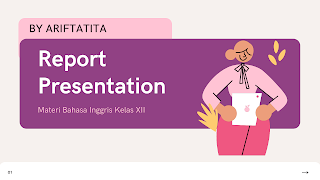An adverbial Clause is a dependent clause that functions as an adverb.
In other words, it contains a subject (explicit or implied) and a predict and
it modifies a verb.
Example:
· I saw Amber when I went to the market (Explicit Subject I )
· When we were in Borobudur Temple, we saw several foreign tourists. When we were in Borobudur Temple is Adverbial Clause.
When an adverbial clause precedes an independent clause, it uses a coma (,) , it means that is used to separate the clause.
See another example bellow!
1. When we were in Magelang, we go to Ketep Pass.
2. We go to Ketep Pass when we were in Magelang.
- when we were in Magelang is an adverbial clause.
- As the PUNCTUATION;
What are the differences of both
sentences above?
Let’s look the first
sentence (1)!
When we were in Magelang, we go to Ketep Pass.
After adverbial clause (when we were in Magelang), there is a comma (,) then its function is used to separate the
clauses.
Then, let’s look the second (2) sentence!
We go to Ketep Pass when we were in Magelang.
Adverbial clause (when we were in
Magelang) is in the last sentence. We do not see a comma (,), it means that
no comma is used in second sentence.
Let’s see another example!
- Because she was tired, she went to rest area. (use comma (,) after adverbial clause)
She went to rest area because she was tired. (no comma (,) is used)
- adverbial Clause: Because she was tired
Well... do you understand?
Hopefully, you will answer, “Yes, I do.”
After that, let’s look the bellow
example, this is different with above examples because it is incorrect
adverbial clause.
Example:
- When we were in Borobudur temple. We saw several foreign tourists. (Incorrect)
- She went to rest area. Because she was tired. (incorrect)
Adverbial clauses are
dependent clauses, they cannot stand by themself. They cannot be alone as a sentence in written
English. Adverbial clauses have to be connected to an independent clause.
You can distinguish
the sentence bellow, which is the correct pattern?
- When we were in Borobudur Temple, we saw several foreign tourists. (Correct)
- When we were in Borobudur temple. We saw several foreign tourists. (Incorrect)
* She went to rest area because she was tired. (correct)
*Because she was tired, she went to rest area. (correct)
*She went to rest area. Because she was tired. (incorrect)
For remember, making a sentence using adverbial clause needs ‘subordinating conjunctions.’ Subordinating conjunctions are the words that
introduce adverb clauses.
There are summary list of words used to introduce adverb clauses;
Kinds of Clauses
|
Common Conjunctions
|
|
Time
|
After
Before
When
While
As
As soon as
Since
Until
|
by the
time (that)
once
as/ so
long as
whenever
every time
(that)
the first
time (that)
the last
time (that)
the nest time (that)
|
Cause
and Effect
|
Because
Now that
since
|
|
Contrast
|
Even though
Although
Though
|
|
Direct
Contrast
|
While
Whereas
|
|
Condition
|
If
Unless
Only if
Whether or
not
Even if
In case
In the event that
|
|






